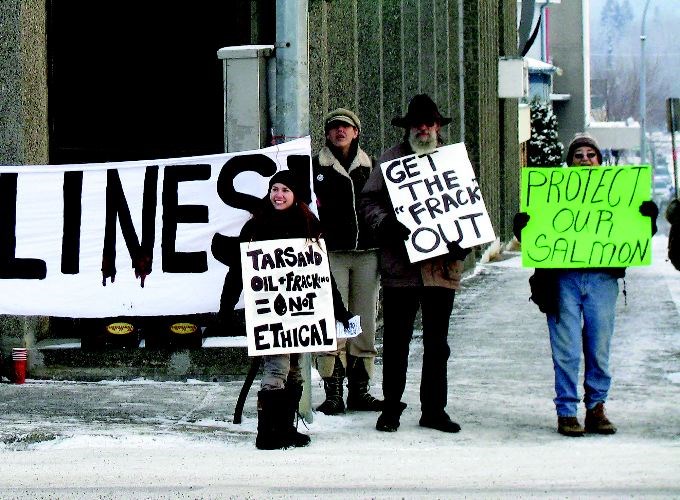The Pacific Trail natural gas pipeline is still a few steps way from getting the go-ahead from the three companies behind the project, about 100 people who attended a workshop on the business opportunities were told Friday.
"We're tremendously serious about this project but at the end of the day, it is a business at the end of the day and is has to make money," the project's vice president Terry Joubert said. "And there are a few things we need to resolve before we give the full green light."
Along with speakers and participants, a small group of protestors gathered in opposition to "fracking" - the hydraulic fracturing of rock layers often used to access gas.
Preliminary cost of the pipeline, combined with a liquified natural gas (LNG) plant at Kitimat, has been put at $5.5 billion and "we have to get rid of all the risk or it doesn't happen," Joubert said.
He said front-end engineering and design needs to be completed to establish clear cost estimates although Joubert added all the work done so far indicates the project makes sense.
Customers for the natural gas, which would be transported to Asia by ship, must also be secured and Joubert said the marketing department of Apache Canada Ltd. the project's lead company is speaking to prospects in China, Korea and Japan.
"These are very meticulous buyers. They want to make sure this is all going to happen, it's going to happen under the conditions that we say, in the time we're going to say."
Three companies are behind the project. Apache Canada Ltd. holds 40 per cent ownership, and Encana Corp. and EOG Resource Inc. each have a 30-per-cent stake.
In October, the National Energy Board granted the trio a permit to export up to 10 million tonnes of liquefied natural gas over a 20-year period.
If they decide to proceed, Joubert said work will begin this summer and end sometime in late-2015, early-2016 with a "sight to behold," namely a ship carrying LNG across the Pacific.
Work has already begun in Kitimat on Haisla Nation territory on the clearing a site for the LNG plant.
Initially estimated to cost $1 billion, the Pacific Trail pipeline would start at Summit Lake, just north of Prince George and travel 463 kilometres to Kitimat.
The project will be a particular boon to the region's aboriginal population - as many as 600 area first nations members will be working on the pipeline.
SALMON SPAWNING CHANNELS THREATENED: OPPONENTS
Supporters have taken pains to avoid confusion between Pacific Trail and Enbridge's controversial Northern Gateway pipeline which would transport bitumen from the Alberta oilsands to Kitimat, pending approval from a federal panel.
Even if the Pacific Trail pipeline springs a leak, the natural gas will dissipate into the air rather than spill out onto the surrounding area, proponents stress.
A small group of protesters nonetheless entered the meeting shortly before noon carrying a banner that read "no pipelines." The same group held a protest against the project in December at the Prince George courthouse.
Protestors Jay Myers and Jeremy Pahl listed as concerns the use of fracking to extract gas from deposits in the B.C. Peace, and opposition from members of a clan of the Wetsuwet'en to the proposal.
In November, members of the Unist'ot'en clan set up a road block to stop exploratory drilling near the Gosnell River.
"Pacific Trail Pipeline's proposed route is through two main salmon spawning channels which provide our staple food supply," clan spokesperson Freda Huson said in a statement issued at the time. "We cannot and will not permit any pipelines through our territory."
Apache spokesperson Paul Wyke said the project's proponents continue to consult with first nations and stakeholders.
After Joubert's presentation, concerns were raised about environmental risks posed by supertankers navigating the Douglas Channel to ship the gas, since ships would run on fuels other than natural gas and would have to negotiate three 90-degree turns on the way in and out.
Joubert said those concerns are being studied and noted the Douglas Channel has been a very active marine channel.



